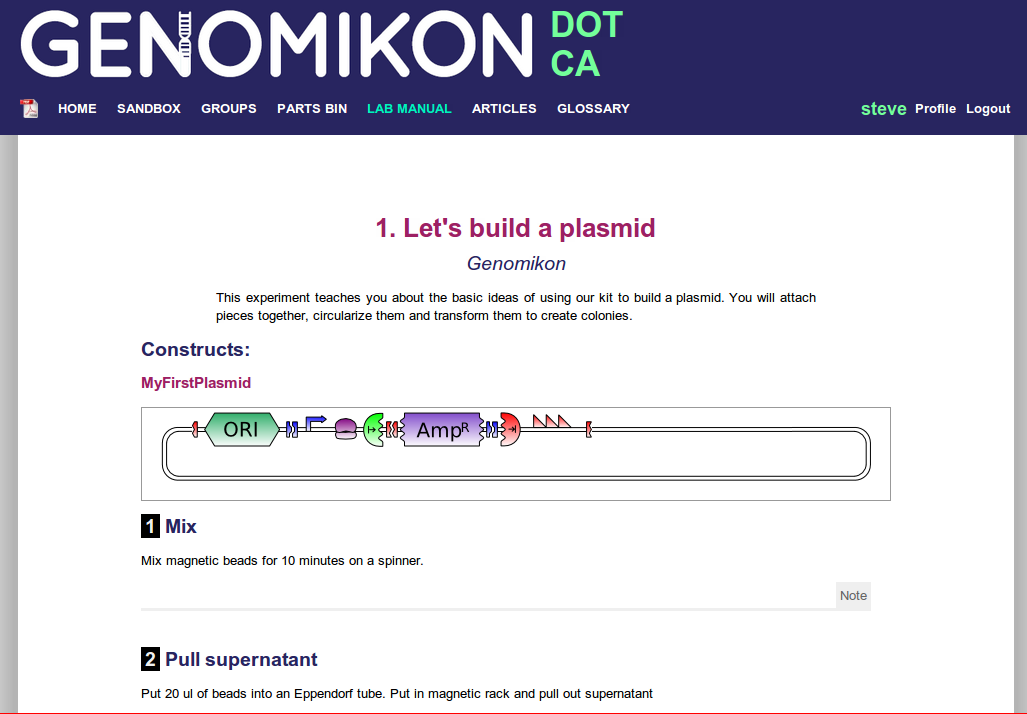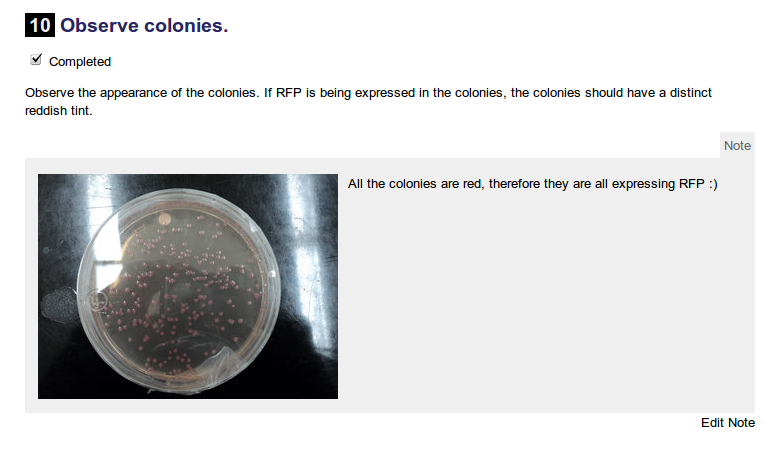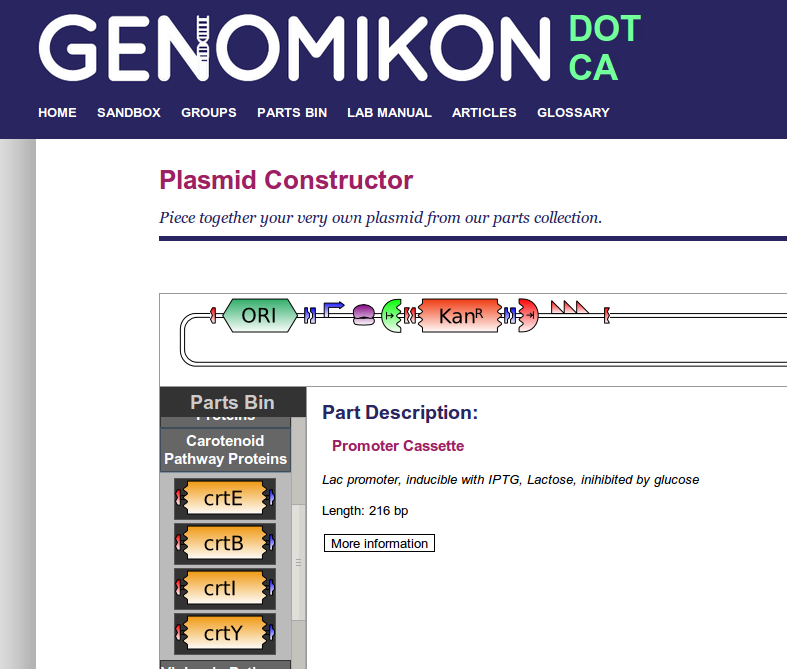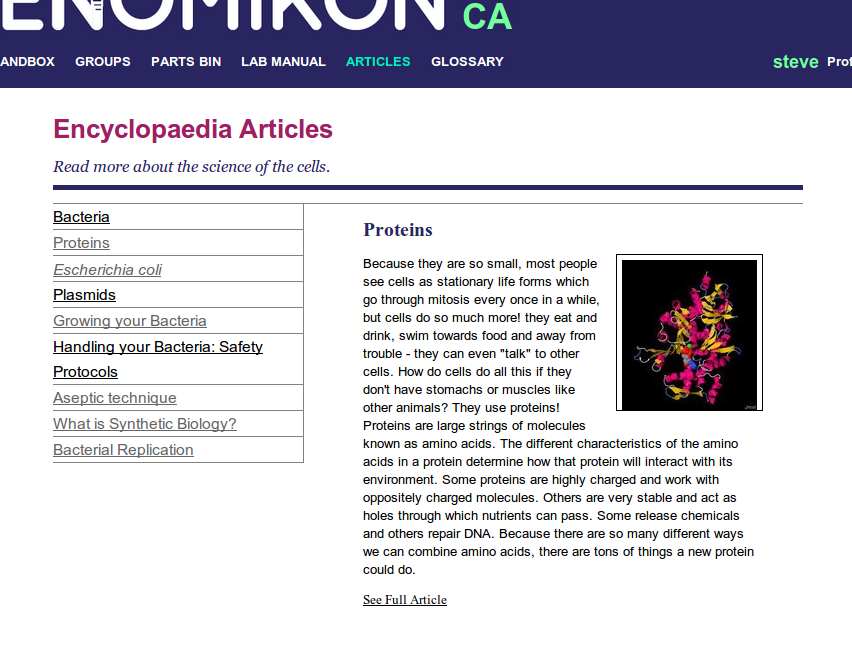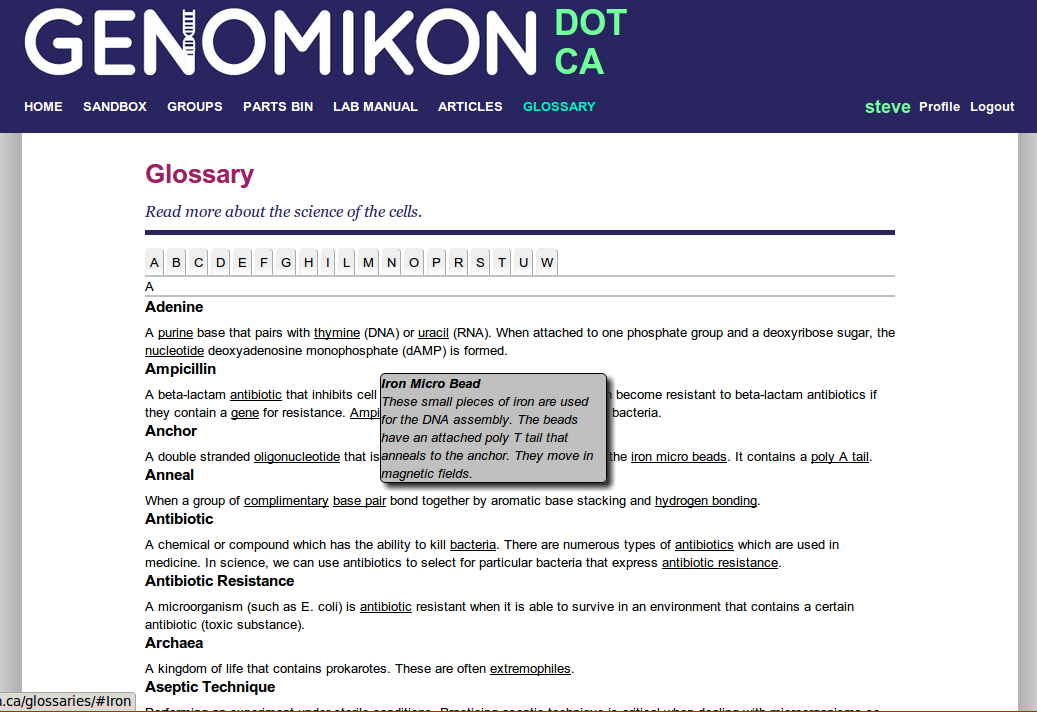Team:Alberta/Software
From 2010.igem.org
(→Mike) |
(→Bringing the classroom online) |
||
| (71 intermediate revisions not shown) | |||
| Line 1: | Line 1: | ||
| - | + | {{Team:Alberta/Head}} | |
| - | = | + | {{Team:Alberta/navbar|software=selected}} |
| - | + | ||
| - | + | ||
| - | + | ||
| - | + | {{Team:Alberta/beginLeftSideBar}} | |
| - | + | {{Team:Alberta/endLeftSideBar}} | |
| - | + | ||
| - | + | ||
| - | + | ||
| - | + | {{Team:Alberta/beginRightSideBar}} | |
| - | == | + | ==Try It!== |
| - | + | Head to [http://www.genomikon.ca GENOMIKON.ca] and start designing your own plasmids right away! Or, create an account and sign in to check out the lab manual. | |
| - | + | ||
| + | ==Technology== | ||
| + | To build our web app, we implemented the following open source technologies: | ||
| + | *[http://rubyonrails.org/ Ruby on Rails] | ||
| + | **A web server back-end framework that uses the Ruby programming language. Implements a [http://en.wikipedia.org/wiki/Model%E2%80%93View%E2%80%93Controller MVC] architecture, and is easily customizable and extendable. | ||
| + | *[http://jquery.com/ jQuery] | ||
| + | **A javascript library that eases user interface design. | ||
| + | *[http://git-scm.com/ git] | ||
| + | **A version control system that we used to share and merge our code. | ||
| + | *[http://github.com/ gitHub] | ||
| + | **Free source code hosting that integrates with git. Github is also an online coding community and makes collaboration easy. | ||
| + | {{Team:Alberta/endRightSideBar}} | ||
| - | + | {{Team:Alberta/beginMainContent}} | |
| - | == | + | ==GENOMIKON ONLINE - Companion Software== |
| - | + | <div id="horiz-line"></div> | |
| + | To assist students in performing their very first molecular biology experiments, we created an online, electronic lab manual to walk them through the process. At [http://www.genomikon.ca GENOMIKON.ca], users of the kit will find an electronic, interactive lab manual. Bringing the lab manual into the twenty-first century, GENOMIKON.ca compliments the kit. It will not only inform students, but also empower them to create their own experiments and share them with the world in an online, DIY molecular biology community. | ||
| + | ==The Lab Manual== | ||
| + | ===Get started with your first molecular biology experiments=== | ||
| + | <div id="horiz-line"></div> | ||
| + | [[Image:Alberta-Screen2.png|thumb|200px|A page out of the lab manual.]] | ||
| + | [[Image:Alberta-Notepic.png|thumb|Users can upload photos of their results]] | ||
| + | The lab manual starts with a set of experiments of predefined experiments, selected with several criteria in mind: | ||
| + | *Fun | ||
| + | *Completable using only materials available in the kit | ||
| + | *Teach concepts that inline with a high school biology curriculum | ||
| + | *Extend beyond the traditional curriculum to inspire students | ||
| - | + | We used the Province of Alberta's high school curriculum as a model. | |
| - | + | As the students progress through the experiments, they can take notes and even upload images of their results. | |
| - | + | ||
| - | + | ||
| - | = | + | <div style="clear:both"></div> |
| - | === | + | ==Plasmid Design Tool== |
| - | [[Image: | + | ===Design your own experimental plasmids=== |
| - | + | <div id="horiz-line"></div> | |
| - | + | [[Image:Alberta-Screen1.png|200px|thumb|In silico plasmid designer]] | |
| - | + | To expand the beyond the traditional "recipe in a cookbook" model of the high school science lab, students | |
| + | are encouraged to design their own plasmids and experiments. With GENOMIKON.ca's intuitive Plasmid Designer, | ||
| + | designing their own unique plasmids is as simple as dragging and dropping parts together on a screen. Students can stick together any combination of the parts available in the kit ''in silico'' with the guidance of the software to ensure certain specifications are met (ie, the plasmid has an origin of replication, it has some sort of selectable marker, incompatible ends have not been stuck together, etc). | ||
| - | + | [https://2010.igem.org/Team:Alberta/PartsDesigner Learn more about the plasmid designer here] | |
| - | + | ||
| - | [ | + | |
| - | + | ||
| - | + | ||
| - | + | ||
| - | + | ||
| - | + | [http://www.genomikon.ca/sandbox Try the plasmid designer out for yourself right now] | |
| - | + | ||
| - | + | ||
| - | + | ||
| - | == | + | ====Software-Automated Protocol Generation==== |
| - | = | + | After students design a valid plasmid for an experiment, the software automatically generates a protocol to create that plasmid and transform into cells using only materials that are available in the kit. Afterwards, the student can add further instructions and descriptions to the experimental plan to show how the transformed cells are to be used. Then, the experimental plan can be published and let loose into the online community at GENOMIKON.ca, where other students and molecular biology experiments can try the experiment themselves. |
| - | [[Image: | + | <div style="clear:both"></div> |
| - | + | ==The Encyclopedia== | |
| - | + | ===Develop a deeper understanding=== | |
| - | + | <div id="horiz-line"></div> | |
| + | [[Image:Alberta-Screen3.png|thumb|200px|The encyclopaedia index]] | ||
| + | To offer some extra context to the experiments, we have included a selection of articles about synthetic biology and various biology concepts relating to the kit and the high school curriculum. They are integrated with the experiments and also available separately for review. | ||
| + | <div style="clear:both"></div> | ||
| + | ==An Integrated Glossary== | ||
| + | <div id="horiz-line"></div> | ||
| + | [[Image:Alberta-Screen4.png|thumb|200px|The glossary, showing a mouse-over popup for a glossary term.]] | ||
| - | + | We have an integrated glossary throughout the website for easy access to definitions. Any glossary terms that appear in the experimental protocols and descriptions can be defined by simply hovering the mouse over a term and reading the popup text. | |
| - | + | <div style="clear:both"></div> | |
| - | + | ==Student and User Groups== | |
| - | + | ===Bringing the classroom online=== | |
| + | <div id="horiz-line"></div> | ||
| + | High school teachers can create and administer user groups and have their students join it. This brings the classroom together online, and gives teachers control over their students' online activities at GENOMIKON.ca. | ||
| - | + | DIY Bio enthusiasts are also encouraged to create and join user groups, giving them the ability to network, communicate, and collaborate with other enthusiasts around the world. | |
| - | + | ||
| - | + | ||
| - | + | ||
| - | + | ||
| - | + | {{Team:Alberta/endMainContent}} | |
| - | { | + | |
| - | + | ||
| - | + | ||
| - | + | ||
| - | + | ||
| - | + | ||
| - | + | ||
| - | + | ||
| - | + | ||
| - | + | ||
Latest revision as of 22:42, 27 October 2010
GENOMIKON ONLINE - Companion Software
To assist students in performing their very first molecular biology experiments, we created an online, electronic lab manual to walk them through the process. At [http://www.genomikon.ca GENOMIKON.ca], users of the kit will find an electronic, interactive lab manual. Bringing the lab manual into the twenty-first century, GENOMIKON.ca compliments the kit. It will not only inform students, but also empower them to create their own experiments and share them with the world in an online, DIY molecular biology community.
The Lab Manual
Get started with your first molecular biology experiments
The lab manual starts with a set of experiments of predefined experiments, selected with several criteria in mind:
- Fun
- Completable using only materials available in the kit
- Teach concepts that inline with a high school biology curriculum
- Extend beyond the traditional curriculum to inspire students
We used the Province of Alberta's high school curriculum as a model.
As the students progress through the experiments, they can take notes and even upload images of their results.
Plasmid Design Tool
Design your own experimental plasmids
To expand the beyond the traditional "recipe in a cookbook" model of the high school science lab, students are encouraged to design their own plasmids and experiments. With GENOMIKON.ca's intuitive Plasmid Designer, designing their own unique plasmids is as simple as dragging and dropping parts together on a screen. Students can stick together any combination of the parts available in the kit in silico with the guidance of the software to ensure certain specifications are met (ie, the plasmid has an origin of replication, it has some sort of selectable marker, incompatible ends have not been stuck together, etc).
Learn more about the plasmid designer here
[http://www.genomikon.ca/sandbox Try the plasmid designer out for yourself right now]
Software-Automated Protocol Generation
After students design a valid plasmid for an experiment, the software automatically generates a protocol to create that plasmid and transform into cells using only materials that are available in the kit. Afterwards, the student can add further instructions and descriptions to the experimental plan to show how the transformed cells are to be used. Then, the experimental plan can be published and let loose into the online community at GENOMIKON.ca, where other students and molecular biology experiments can try the experiment themselves.
The Encyclopedia
Develop a deeper understanding
To offer some extra context to the experiments, we have included a selection of articles about synthetic biology and various biology concepts relating to the kit and the high school curriculum. They are integrated with the experiments and also available separately for review.
An Integrated Glossary
We have an integrated glossary throughout the website for easy access to definitions. Any glossary terms that appear in the experimental protocols and descriptions can be defined by simply hovering the mouse over a term and reading the popup text.
Student and User Groups
Bringing the classroom online
High school teachers can create and administer user groups and have their students join it. This brings the classroom together online, and gives teachers control over their students' online activities at GENOMIKON.ca.
DIY Bio enthusiasts are also encouraged to create and join user groups, giving them the ability to network, communicate, and collaborate with other enthusiasts around the world.
 "
"

